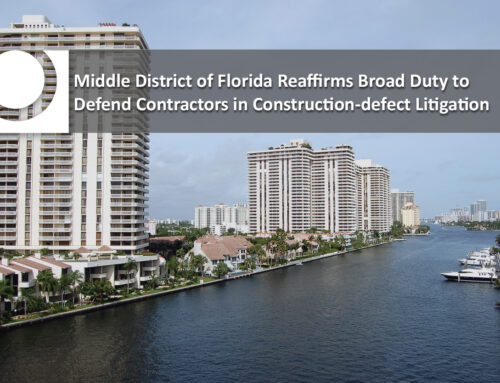Last year, I wrote about a decision by Florida’s Fourth District Court of Appeal (link here) holding that an insured, post-loss, could assign its claim against its homeowner’s insurance policy. Recently, the same issue was before the Second District.
In Bioscience West, Inc. v. Gulfstream Property & Casualty Ins. Co., Bioscience West, Inc. (“Bioscience”) performed emergency water-removal and construction services for Gulfstream’s insured and, in exchange for Bioscience’s services, the insured assigned her rights to insurance proceeds under the Gulfstream policy. Bioscience then filed a lawsuit against Gulfstream for breach of contract based upon Gulfstream’s denial of insurance coverage.
The trial court granted Gulfstream’s motion for summary judgment, reasoning that the policy prohibited the assignment of benefits without the consent of Gulfstream, which the insured never received. The trial court further found that the assignment improperly transferred the right to adjust the claim to Bioscience.
 The Bioscience court reversed. First, the Court reasoned that the insurance policy prohibited an insured’s assignment of the entire policy without Gulfstream’s consent, not an insured’s post-loss assignment of a claim. The Court looked to the “loss-payment” provision of the insurance policy, which provided that the insurer “will pay you unless some other person … is legally entitled to receive payment.” Based on this policy language, the Court noted that Gulfstream anticipated the need to pay those legally entitled to receive payment, even if that person was not named as an insured.
The Bioscience court reversed. First, the Court reasoned that the insurance policy prohibited an insured’s assignment of the entire policy without Gulfstream’s consent, not an insured’s post-loss assignment of a claim. The Court looked to the “loss-payment” provision of the insurance policy, which provided that the insurer “will pay you unless some other person … is legally entitled to receive payment.” Based on this policy language, the Court noted that Gulfstream anticipated the need to pay those legally entitled to receive payment, even if that person was not named as an insured.
Second, the Court disagreed with Gulfstream’s argument that the assignment of benefits to Bioscience violated § 626.854(16), one of Florida’s public-adjusting statutes. This statute provides that a “licensed contractor … may not adjust a claim on behalf of an insured unless licensed and compliant as a public adjuster under this chapter.” The Court found there was no evidence that Bioscience adjusted the claim, but instead provided only emergency, post-loss water-removal services. Specifically, the court noted that Bioscience did not determine the amount due under the policy.
Third, the Court rejected Gulfstream’s argument that the assignment of benefits violated a different Florida statute. Section 627.405 provides that an insurance policy is not enforceable where the insured did not have insurable interest in the insured property. The Court noted that the insured had an insurable interest in the property at the time of the loss and the insured assigned her “vested insurable interest by the post-loss execution of the assignment of benefits to Bioscience.”
Lastly, the Court reiterated that “Florida case law yields deep-rooted support for the conclusion that post-loss assignments do not require an insurer’s consent.” The Court stated that nearly 100 years ago, the Florida Supreme Court recognized that provisions in an insurance policy requiring consent to assignment of that policy do not apply to assignments after a loss, which was reaffirmed by the Florida Supreme Court in 1998. As a result, the Court reversed the summary judgment in favor of Gulfstream, finding the post-loss assignment was valid.
As with the Fourth District opinion last year, the decision is advantageous to service providers and insureds alike because it reaffirms Florida law and allows an insured to receive covered emergency services without having to come out of pocket for the services.
Opinion reprinted from WestlawNext with permission of Thomson Reuters. If you wish to check the currency of this case by using KeyCite on WestlawNext, please visit www.next.westlaw.com.



